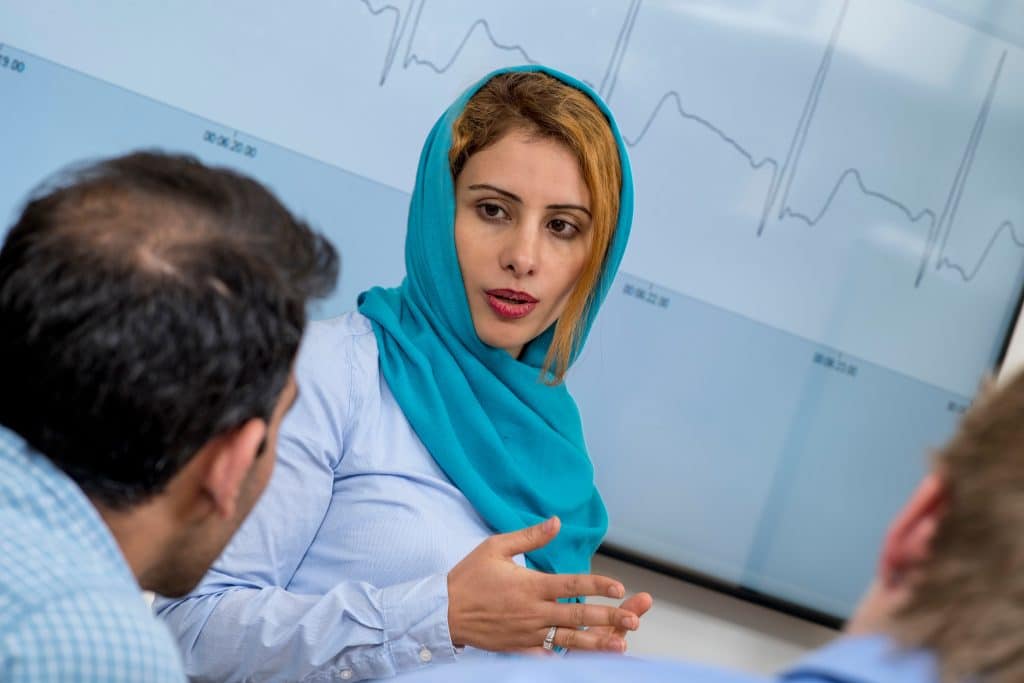Nov. 7, 2019
Imagine, after an earthquake, if rescue workers knew exactly where to find survivors amid the rubble before they set foot in the affected area. It would likely mean more lives saved more quickly and fewer rescue workers put in danger as they searched.
That outcome is an eventual goal for Fatemeh Afghah, an assistant professor in the School of Informatics, Computing, and Cyber Systems (SICCS) at Northern Arizona University. She was one of 40 researchers nationwide recognized with the Air Force Young Investigator Award, a grant given intended to foster creative basic research in science and engineering, enhance career development and provide opportunities for engineers to address military challenges in science and engineering.
She is the only Arizona researcher to receive this award this year, which is a three-year, $450,000 grant.
Afghah’s project is to developing an algorithm to enable an unmanned aerial vehicle—a UAV or drone—to monitor disaster-impacted areas. The fully autonomous system should be able to monitor the area, send pictures, develop a task list and a task allocation mechanism to assign work to other UAVs.
“If you have UAVs, there’s a shorter response time to get a first estimation of the situation,” Afghah said. “It’s the same case in flooding or in finding survivors after a disaster. Having these UAVs is going to make it easier and faster for us to figure out what’s going on.”
Afghah’s research has particular significance to northern Arizona. One planned use is monitoring wildfires in remote or difficult-to-access areas. The UAVs and their smart systems will be able to beat fire trucks to these fires and assess how big the fire is, where it is burning the fastest and what areas in danger. By the time firefighters arrive, they will have better information on the smartest way to fight the flames. That’s better for everyone, she said.
She envisions the algorithm connecting several UAVs that are smaller, nimbler and less expensive than one large UAV. Each would be equipped with different tools; some would have cameras; others would have lasers. They would work together to gather an entire picture, with the algorithm dictating tasks to each UAV without a human on the ground making decisions.
There likely also are other applications as well, she said—other technologies that could be on UAVs to respond to different disasters. At some point, she’s hopeful UAVs will be able to take on some of the heavy lifting or other physical tasks. But right now, her focus is creating the algorithm that will enable UAVs to work together and make those smart and cooperative decisions to help monitor and observe disaster zones.
“The Air Force’s Young Investigator Award is only given to a small fraction of the nation’s early-career researchers and is a clear recognition of Dr. Afghah’s excellent work,” said SICCS director Ben Ruddell. “It also signals to NAU’s partners and prospective students that NAU’s School of Informatics, Computing, and Cyber Systems is a nationally prominent center for research of intelligent and autonomous systems.”
Afghah’s research focus is on autonomous decision-making—creating smart machines that can gather data and make decisions based on that data. She has done work in the biomedical field, working on heart monitoring devices designs to detect different signals, diagnose a condition and react accordingly with medication or another course of action in the same way as a cardiologist would.

Heidi Toth | NAU Communications
(928) 523-8737 | heidi.toth@nau.edu



